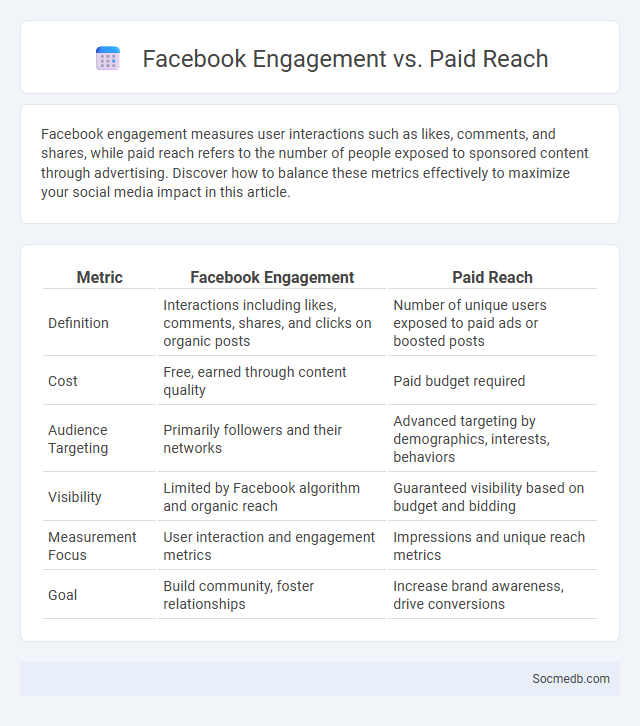
Photo illustration: Facebook Engagement vs Paid Reach
Facebook engagement measures user interactions such as likes, comments, and shares, while paid reach refers to the number of people exposed to sponsored content through advertising. Discover how to balance these metrics effectively to maximize your social media impact in this article.
Table of Comparison
| Metric | Facebook Engagement | Paid Reach |
|---|---|---|
| Definition | Interactions including likes, comments, shares, and clicks on organic posts | Number of unique users exposed to paid ads or boosted posts |
| Cost | Free, earned through content quality | Paid budget required |
| Audience Targeting | Primarily followers and their networks | Advanced targeting by demographics, interests, behaviors |
| Visibility | Limited by Facebook algorithm and organic reach | Guaranteed visibility based on budget and bidding |
| Measurement Focus | User interaction and engagement metrics | Impressions and unique reach metrics |
| Goal | Build community, foster relationships | Increase brand awareness, drive conversions |
Introduction to Facebook Engagement and Paid Reach
Facebook engagement directly impacts the visibility and effectiveness of your social media campaigns by influencing how users interact with your content through likes, comments, and shares. Paid reach on Facebook allows you to extend your audience beyond organic followers by targeting specific demographics, interests, and behaviors to maximize ad performance. Understanding the balance between organic engagement and paid reach can help you optimize your marketing strategy for better ROI.
Defining Facebook Engagement: Key Metrics and Actions
Facebook engagement measures how users interact with your content through likes, comments, shares, and clicks, reflecting audience interest and activity. Key metrics include post reactions, video views, page follows, and message responses, offering insights into content effectiveness and user connection. Optimizing your Facebook engagement boosts visibility, enhances brand loyalty, and increases overall reach within your target audience.
Understanding Paid Reach on Facebook
Facebook's paid reach refers to the number of unique users who see your content as a result of paid advertisements or boosted posts. Optimizing your budget and targeting parameters increases your paid reach efficiency, ensuring that your ads reach the most relevant audience. Understanding your paid reach metrics helps improve ad performance by tailoring content to engage Your specific demographic effectively.
Organic Engagement vs Paid Engagement: What’s the Difference?
Organic engagement on social media refers to the interactions, such as likes, comments, and shares, that occur naturally without paid promotion, relying on genuine audience interest and content quality. Paid engagement involves boosting posts or running targeted ads to increase visibility and interaction by reaching a broader or specific audience, often delivering quicker results. Understanding the balance between organic and paid strategies helps you optimize your social media presence and maximize authentic connections with your audience.
How Facebook’s Algorithm Impacts Engagement and Reach
Facebook's algorithm prioritizes content that sparks meaningful interactions by analyzing user behavior, such as likes, comments, and shares, to boost posts with higher engagement in news feeds. Your content's visibility depends largely on how well it encourages genuine user engagement, with Facebook favoring posts from friends, family, and groups over brands or pages. Optimizing your posts to generate active interaction can significantly increase reach and improve overall engagement rates on the platform.
Benefits of Focusing on Paid Reach
Focusing on paid reach in social media strategies enhances targeted audience engagement by leveraging precise demographic, geographic, and behavioral data for ads. Businesses benefit from measurable ROI through optimized ad spend and advanced analytics, which facilitate continuous improvement in campaign performance. This approach also boosts brand visibility quickly, enabling faster conversion rates compared to organic efforts reliant on algorithmic timelines.
Strategies to Boost Organic Facebook Engagement
Effective strategies to boost organic Facebook engagement include posting high-quality, relevant content tailored to the target audience's interests and behaviors. Leveraging Facebook's native features such as Stories, Live Videos, and interactive polls increases visibility and user interaction. Consistent posting schedules combined with timely responses to comments and messages foster community trust and long-term engagement growth.
Pros and Cons: Paid Reach vs Organic Engagement
Paid reach on social media delivers immediate exposure to targeted audiences, boosting brand visibility and driving conversions effectively. Organic engagement fosters authentic relationships and trust with followers, promoting long-term loyalty but often grows slower and less predictably. Balancing paid reach with organic strategies optimizes overall social media performance by combining rapid results with sustainable community building.
Measuring Success: Key Performance Indicators to Track
Tracking key performance indicators (KPIs) such as engagement rate, click-through rate, and follower growth is essential for measuring social media success. Monitoring metrics like conversion rate and share of voice provides insights into your brand's reach and influence. You can optimize your social media strategy by analyzing these data points to enhance audience interaction and campaign effectiveness.
Conclusion: Choosing the Right Approach for Your Facebook Marketing
Selecting the right approach for Facebook marketing depends on clearly defining target audiences, leveraging data-driven strategies, and consistently analyzing performance metrics. Integrating organic content with targeted paid advertising maximizes reach and engagement while aligning with business objectives. Prioritizing adaptability and ongoing optimization ensures sustained growth and effective return on investment across campaigns.
 socmedb.com
socmedb.com